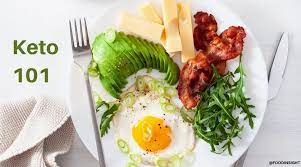Embarking on a ketogenic (keto) diet requires a paradigm shift in your eating habits. This high-fat, low-carbohydrate diet has gained immense popularity due to its potential to aid in weight loss, improve mental clarity, and offer other health benefits. In this post, we will delve into the world of high-fat, low-carb foods, exploring why they are essential on a keto diet and how they can contribute to your overall well-being.
The Keto Diet: A Brief Overview
High-Fat, Low-Carb Foods: What to Eat
Avocados: Packed with healthy fats, avocados are a keto staple.Coconut Oil: A great source of medium-chain triglycerides (MCTs), which are easily converted into ketones.
Nuts and Seeds: Almonds, chia seeds, and flaxseeds are excellent choices.
Olive Oil: Rich in monounsaturated fats, perfect for salads and low-heat cooking.
Fatty Fish: Salmon and mackerel provide omega-3 fatty acids.
Cheese: Opt for hard, full-fat varieties.
Eggs: A complete protein source and rich in fats.
Butter and Cream: Choose grass-fed when possible.
Meat: Fatty cuts of beef, pork, and lamb are ideal.
Leafy Greens: Low in carbs and high in fiber.
Berries: In moderation, berries can fit into a keto diet.
Dark Chocolate: Choose high cocoa content and low sugar varieties.
Full-Fat Dairy: Yogurt and cottage cheese can be included.
Vegetables: Non-starchy options like broccoli, cauliflower, and zucchini.
Herbs and Spices: Enhance flavor without adding carbs.
Why Choose High-Fat, Low-Carb Foods on Keto?
Promotes Ketosis: These foods help maintain the metabolic state crucial for the keto diet’s success.Satiety: High-fat foods are more satiating, reducing overall calorie intake.
Stable Energy: Fat provides a consistent energy source, preventing energy crashes.
Improved Mental Clarity: Ketones are a more efficient brain fuel.
Blood Sugar Control: Reduced carb intake stabilizes blood sugar levels.
Adopting a keto lifestyle means embracing high-fat, low-carb foods as the cornerstone of your diet. These foods not only facilitate the metabolic state of ketosis but also offer numerous health benefits, from weight loss to improved mental clarity. By making informed food choices, you can reap the rewards of this powerful dietary approach.

.jpg)
.jpg)



